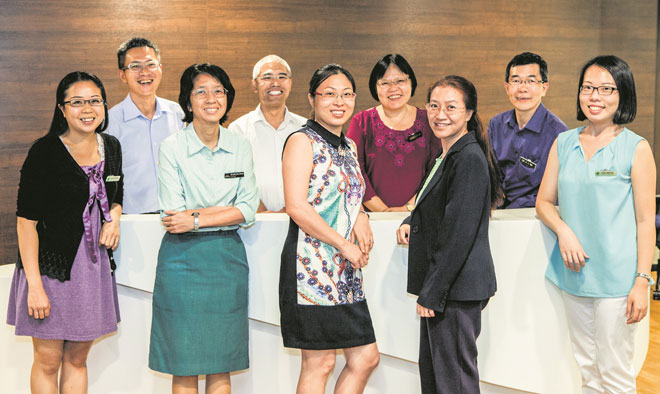
Members of the study team are (from left) Dr Wong Wan Hui, Mr Ricky Ang Seng Kok, Dr Linn Yeh Ching, Dr Tan Chuen Wen, Ms Li Xiaomei, Associate Professor Lee Lai Heng, Associate Professor Koh Hwee Ling, Associate Professor Ng Heng Joo and Ms Fung Foon Yin. They are mostly from SGH except for Mr Ang who is from the National Cancer Centre Singapore and Prof Koh who is from the National University of Singapore.
STUDY suggests three commonly used herbal supplements may be safe to use with aspirin after all
Turmeric, and danggui (Chinese angelica) are two frequently used herbs in traditional Chinese medicine (TCM) for their “blood-activating” or anti-clotting properties, while another, ginseng, is known for its qi-tonifying (qi is vital energy) qualities.
All also have prompted some concerns in Western medical circles of being unsafe when used in combination with blood-thinning drugs like aspirin.
However, the findings of a study led by Dr Linn Yeh Ching, Senior Consultant, Department of Haematology, Singapore General Hospital (SGH), suggest otherwise.
“We believe that our findings provide level 1 (the highest level in a clinical trial) evidence that none of these three herbs – turmeric, danggui and ginseng – increased the risk of bleeding when used alone or in combination with aspirin,” said Dr Linn.
“Low-dose aspirin prevents the clotting of blood and is therefore commonly used to prevent strokes or heart attacks in people who are at risk. The same people may also consume herbs as supplements,” she said, noting that in Singapore, TCM is the most commonly used form of complementary and alternative medicine, even among the non-Chinese.
The study, which was funded by the SingHealth Foundation Research Grant, clinched second prize in the Young Investigator’s Award (Clinical Research) category at SingHealth Group’s Annual Scientific Meeting 2015.
“Blood-activating” in TCM broadly refers to the promotion of blood circulation, said Ms Fung Foon Yin. A student at Duke-NUS Medical School, she was formerly the Traditional Medicine Resource Executive at SGH’s Pharmacy Department.
“For example, (the belief is that) if someone complains of shoulder pain, it may be due to poor blood circulation. The meridians, through which the body’s qi or vital energy flows, may also be blocked. To resolve the blockage, ‘blood-activating’ herbs may be used,”
said Ms Fung, who worked closely with Dr Linn on the study.
But herbs are rarely used by themselves in TCM. Instead, they are often combined in classic or standard formulations, as well as individualised prescriptions.
For instance, a patient with “stagnation of the liver qi” will likely be prescribed a herb combination to regulate the liver qi. Other herbs may be added to boost qi if there are other issues such as qi deficiency.
The team chose to study these three herbs as they have not been well-researched in humans despite their popular consumption, apart from some laboratory observations of human and animal blood. Yet, most reputable resources cautioned against using them in patients with bleeding tendencies or in those who are taking aspirin or other anti-clotting drugs.
“That’s because the herbs, classified as ‘blood-activating’, were expected to amplify the effects of aspirin and cause an increase in bleeding. This could show up in the form of heavier or prolonged menstruation, excessive bleeding when brushing teeth, unexplained bruises on the body, or an increased risk of post-operative bleeding,” said Dr Linn. Study participants, who were healthy volunteers, were asked to use a questionnaire to report such symptoms and/ or other side effects. In addition, blood tests – clotting assays, platelet function and research-level thrombin generation assays – were carried out at intervals to assess if the body’s natural clotting ability was affected. Together, the tests give a comprehensive measurement of a person’s clotting function.
Both the blood test and the questionnaire concluded that all three herbs, when taken at the recommended dose as health supplements and either alone or with aspirin, did not increase the risk of bleeding.
Dr Linn hopes more of such studies can be done to gain a better understanding of a wider range of TCM herbs. Past surveys showed that many people who took some form of complementary and alternative medicine do not discuss their use with their Western medicine doctors, putting them at risk of potential interactions between those substances.
“We have presented our study at a few conferences and hope to get it published so that it can reach a wider group of health care providers,” she said.
• This story was first published in Singapore Health, Jan-Feb 2016 issue.
